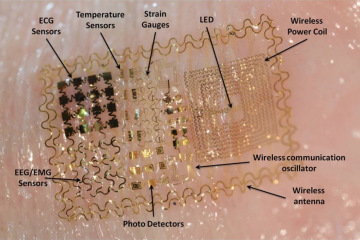You’ve probably heard of brain implants acting as biomedical prostheses which help people to manipulate neuroprosthetic arms and legs or simply push a mouse cursor using nothing but thought.
Now a group of Researchers at the University of California San Diego are up to, creating “electronic tattoos” capable of interfacing with your brain and wirelessly conveying your thoughts as commands to remote systems and devices.
According to the lead researcher, Dr. Todd Coleman, the electronic tattoos will make use of an “ultrathin conformal” design.
Coleman has been developing “foldable, stretchable electrode arrays” that can non-invasively pick up neural signals, EEG-style.
Coleman’s solution amounts to a tiny piece of pliable skin-like material less than the thickness of a human hair and houses “epidermal electronic” circuitry powered by solar cells or antennae, which also allow it to communicate wirelessly.
Coleman and his team of researchers are actively working on creating electronic tattoos capable of manipulating external electronics like remote-control drones.
It gets even wilder. Imagine placing one of these electronic tattoos near your throat, where it might pick up on subvocal muscle movements. When you think about speaking, forming words in your mind, muscles in your throat and tongue actually move in extremely subtle ways undetectable without sensors. Add one of Coleman’s sensor-laced tattoos and not only might you be able to convert those movements into speech, the tattoos could actually relay words to someone (or something) else wirelessly. If your friend across the room has a smartphone capable of receiving the data, plugged into a pair of earbuds, they could actually hear your speech-related thoughts.
“We’ve demonstrated our sensors can pick up the electrical signals of muscle movements in the throat so that people can communicate just with thought,” says Coleman, adding that the tattoos could also be used to improve speech recognition.



Leave a Reply